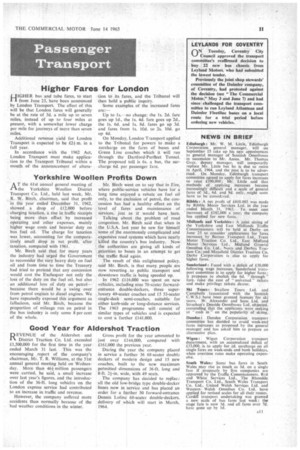Yorkshire Wooll en Profits Down
Page 13

If you've noticed an error in this article please click here to report it so we can fix it.
AT the 61st annual general meeting of the Yorkshire Woollen District Transport Co. Ltd., held last week, Mr. R. W. Birch, chairman, said that profit in the year ended December 31, 1962, showed a drop of £12.000 before charging taxation, a rise in traffic receipts being more than offset by increased operating and other expenses, mainly higher wage costs and heavier duty on bus fuel oil. The charge for taxation was lower, accounting for the comparatively small drop in net profit, after taxation, compared with 1961.
Mr. Birch said that for many years the industry had urged the Government to reconsider the very heavy duty on fuel oil and from time to time the Treasury had tried to pretend that any concession would cost the Exchequer not only the loss of the duty on the fuel oil, but also an additional loss of duty on petrol— because there would be a swing over from petrol engines to diesel engines. We have repeatedly exposed this argument as fallacious, said Mr. Birch, because the proportion of mileage run on petrol in the bus industry is only some 8 per cent of the whole. Mr. Birch went on to say that in Eire, where public-service vehicles have for a long time enjoyed a rebate on fuel oil only, to the exclusion of petrol, the concession has had a healthy effect on the level of fares and maintenance of services, just as it would have. here.
Talking about the problem of road congestion. Mr. Birch said that when in the U.S.A. last year he saw for himself some of the enormously complicated and expensive road systems which have nearly killed the country's bus industry. Now the authorities are giving all kinds of priorities to buses in an attempt to get the traffic fluid again.
The result of this enlightened policy. said Mr. Birch, is that many people arc now reverting , to public transport and downtown traffic is being speeded up.
In 1962 £116,000 was spent on new vehicles, including nine 70-seater forwardentrance double-deckers, three superluxury 49-seater coaches and 15 53-seater single-deck semi-coaches, suitable for either kerb-side or long-distance services. The 1963 programme will consist of similar types of vehicles and is expected to cost a further £141,000.
























































































































































